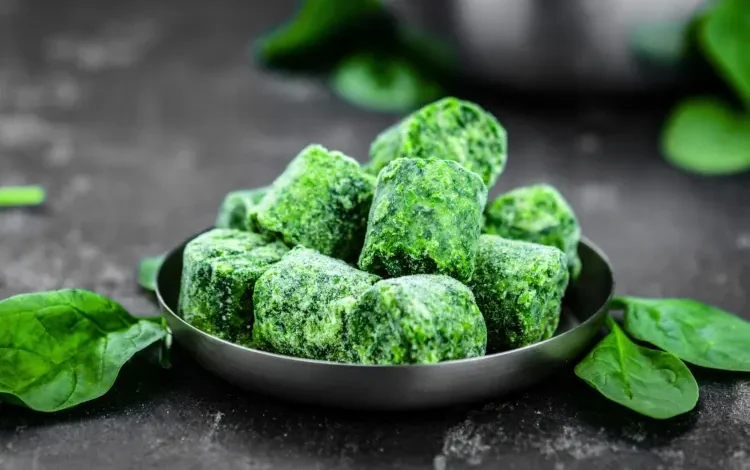Can You Freeze Spinach? A Guide to Freezing Fresh and Cooked Spinach

Freezing spinach is an excellent way to preserve this nutritious green, especially if you have an abundant supply that you can’t consume before it spoils. But how exactly should you freeze spinach? Can you freeze spinach without blanching it first? How long will it last in the freezer? These are common questions for those looking to make their spinach last longer. This comprehensive guide will weigh all aspects of freezing spinach, whether fresh, cooked, or even in sauces.
Why Should You Freeze Spinach?
Spinach is a versatile and nutrient-dense leafy green that can easily be incorporated into various dishes, including smoothies, soups, stews, salads, and casseroles. However, when stored fresh, spinach has a short shelf life, typically lasting just a few days in the refrigerator before it wilts. By freezing spinach, you extend its life, preserve nutrients, and make it more convenient for future use.
Freezing spinach is also a great solution if you’vevyou’veach in bulk or have extra from your garden harvest. Instead of letting it go to waste, you can freeze it and use it for months.
Can You Freeze Fresh Spinach Without Cooking It?
The short answer is yes, you can freeze fresh spinach. However, there are some critical steps you need to follow to preserve the texture and nutritional value of the spinach.
Step-by-Step Guide to Freezing Fresh Spinach
- Wash the Spinach Thoroughly: Before freezing fresh spinach, wash the leaves thoroughly to remove dirt and pesticides. Place the spinach in a colander and rinse it under cold running water.
- Blanching: Although not strictly necessary, blanching spinach before freezing is highly recommended. Blanching helps preserve the spinaspinach’sr’s texture and nutritional content. To blanch, boil a large pot of water, add the spinach leaves, and boil them for about 1–2 minutes. Immediately transfer the spinach to a bowl of ice water to stop cooking.
- Drain and Dry: After blanching and cooling, drain the spinach thoroughly and pat it dry with paper towels. Excess water can lead to freezer burn, so removing as much moisture as possible is essential.
- Pack the Spinach in Freezer Bags or Containers: Once the spinach is dry, portion it into freezer-safe bags or airtight containers. Remove as much air as possible to prevent freezer burn.
- Label and Freeze: Label the bags with the current date so you’ll know how long they have been stored in the freezer. Place the spinach bags flat in the freezer for optimal storage.
Can You Freeze Spinach Without Blanching?
Yes, freezing spinach without blanching is possible, but it may not last as long in the freezer, and its texture might degrade over time. If you plan to use your spinach within a few months, freezing without blanching is an option. However, blanching spinach will last up to 12 months in the freezer without significant quality loss.
Can You Freeze Cooked Spinach?
Cooked spinach can also be frozen, making saving leftovers for future use easy. Freezing cooked spinach is simple, and you can follow these steps:
- Cool the Cooked Spinach: Allow the spinach to cool completely before freezing. If you freeze spinach while it’s hot may cause ice crystals to form, leading to freezer burn and mushy spinach when thawed.
- Portion the Spinach: Divide the cooked spinach into portion sizes based on how you intend to use it in the future. For example, if you typically add spinach to soups or casseroles, freeze it in portions that align with your recipes.
- Use Freezer Bags or Airtight Containers: Place the portioned cooked spinach into freezer-safe bags or containers. Remove as much air as possible from the bags to prevent freezer burn.
- Label and Freeze: As with fresh spinach, label the bags or containers with the freezing date and store them in the freezer.
Cooked spinach can last up to six months in the freezer without losing flavor or texture. When ready to use, simply thaw it in the refrigerator or add it directly to your dish while cooking.
Can You Freeze Spinach for Smoothies?
Adding it to smoothies is one of the most convenient uses for frozen spinach. Frozen spinach is perfect for this because it blends easily and provides a chilled texture to your smoothie without the need for ice. If you regularly make green smoothies, freezing spinach in small portions will save you time and prevent waste.
How to Freeze Spinach for Smoothies
- Blanch and Dry: With freezing fresh spinach, blanch the leaves, cool them in ice water, and then dry them thoroughly.
- Portion into Ice Cube Trays: Spoon small portions of spinach into ice cube trays and freeze them until solid. Once frozen, pop the spinach cubes out of the tray and store them in freezer-safe bags.
- Store for Easy Use: Keep a bag of spinach cubes in your freezer, ready for your smooathey’reourthies anytime. Each cube can be added directly to the blender with other smoothie ingredients.
How Long Does Frozen Spinach Last?
The shelf life of frozen spinach depends on whether it was blanched before freezing. Blanched spinach can last up to 12 months in the freezer, whereas unblanched spinach typically lasts about two months before losing its texture and nutritional value.
Cooked spinach can last up to six months in the freezer. However, it’s essential to put frozen spinach in airtight containers or freezer-safe bags to prevent freezer burn, which can significantly reduce the quality of the spinach over time.
How to Thaw Frozen Spinach
When it comes to thawing frozen spinach, you have a few different methods depending on how you plan to use it:
- Refrigerator Thawing: The best method for maintaining the texture and nutrients of frozen spinach is to thaw it in the refrigerator. Place the spinach in a bowl and allow it to thaw overnight.
- Microwave Thawing: If you’re ready, throw spinach in the microwave. Place the spinach in a microwave-safe dish and use the defrost setting.
- Add Directly to Cooking: You can add frozen spinach directly to your soups, stews, or casseroles without thawing. The spinach will thaw as the dish cooks.
Frequently Asked Questions (FAQs)
Q: Can you freeze baby spinach?
A: You can freeze baby spinach using the same methods as regular spinach. Baby spinach freezes well and can be used in smoothies, soups, and other dishes.
Q: Can you freeze spinach without blanching it?
A: Yes, but blanching helps to preserve the texture, color, and nutrients. Spinach that has not been blanched will not last as long in the freezer.
Q: Does frozen spinach lose nutrients?
A: Freezing spinach preserves most nutrients, especially if blanched before freezing. Freezing may cause a slight loss of some vitamins, but frozen spinach retains its nutritional value.
Q: How can I prevent freezer burn when freezing spinach?
A: Remove as much air as possible from the freezer bags or containers to prevent freezer burn. Use airtight packaging and consider double-bagging for added protection.
Q: How long can you freeze spinach?
A: Blanched spinach can be frozen for up to 12 months, while unblanched spinach lasts about two months. Cooked spinach can be stored in the freezer for up to six months.
Q: Can you freeze spinach dip or spinach sauce?
A: Yes, you can freeze spinach dips and sauces. Store them in airtight containers and freeze them for up to three months. Thaw in the refrigerator before reheating.
Final Thoughts
Freezing spinach is a simple and practical way to reduce waste and ensure that you have this nutrient-packed leafy green available for cooking, even out of season. Whether you freeze it fresh, cooked, or for smoothies, the process can help you preserve its quality and nutritional value for months. Remember to blanch spinach if you want to extend its freezer life, and always store it in airtight packaging to prevent freezer burn.
By following the steps outlined in this guide, you can enjoy the benefits of spinach year-round, making meal prep faster and easier.
Category for Publishing:
Food Storage and Preservation
Sources:



